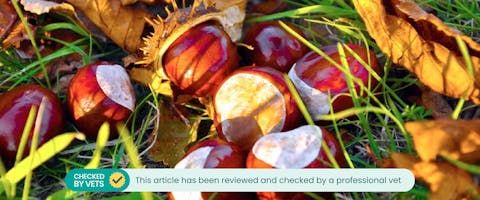Updated 29/09/2023
Avidly collected by children over autumn and featuring in popular rhymes and songs, it would seem that conkers are pretty harmless, right? Well with the seeds of the horse chestnut tree dropping all over our forest floor as the months grow colder, pet parents might be wondering - are conkers toxic to dogs or can dogs eat conkers? Well here we dive into exactly that, so that you can keep your pup’s walkies safe during late summer and autumn.
Trending posts
Purr-use some of the top blogs our members have been loving this month- Top male dog names for your new furry friendGot a new furry family member in your pack? Check…

- Top female dog names for your new fluffy palWelcoming a new pooch into your family? Explore…

- 120+ gray cat names your silver feline will loveRecently welcomed a fluffy gray bundle of joy into…

- What are normal pet sitting rates?Discover the average pet sitting rates for animals…

- Unique dog names to stand out from the packDare to be different with our list of the best…

Are conkers toxic to dogs?
So, are conkers poisonous to dogs? Unfortunately, yes, conkers are toxic to dogs and should be avoided at all costs by pet parents and canine passers by. Not only can conkers cause a life-threatening blockage to your pup’s airways, they also contain the toxic chemical known as aesculin, which is poisonous to dogs. The chemical is not only present in conkers, but it’s found in all parts of the horse chestnut tree which is also toxic to dogs. If you think your pup has nibbled on a conker, you should contact your veterinarian for advice as a matter of emergency - don’t wait for symptoms of toxicity (see below) to arise before you seek medical attention for your pup.
Conker poisoning in dogs
So, conkers and dogs simply don’t mix, but what are the effects of toxicity if your pup does get a little too curious, and takes a chunk out of a conker? Well here we’re exploring the symptoms of conker poisoning in dogs so that you know the severity of what might seem like an innocent nibble. We’ll also take a look at some of the methods of diagnosis your vet may take, along with possible treatments.
Symptoms
- Vomiting
- Diarrhea
- Abdominal pain
- Restlessness
- Lethargy
- Collapse
- Tremors
The severity of your pup’s symptoms will depend on a variety of factors, including how much of the conker was ingested, how long ago it happened, plus the breed, age, size and gender of your pup, too. In some cases, symptoms can arise as quickly as six hours after ingestion, whereas in others it can take up to two days. Either way, don’t wait for symptoms to develop - contact your vet as a matter of emergency if you suspect ingestion of conkers.
Diagnosis
If your pup was having a little too much fun in the forest and ended up nibbling on a conker (which you weren’t able to remove from their mouth yourself), you should contact a vet straight away for advice. If you’re called in for an appointment, it’s likely your vet will perform a physical exam of your pup along with a blood test to get an idea of internal activity, followed up with a urinalysis to assess the severity of the conker poisoning.
Treatment
As conkers can cause a variety of problems with your pup, treatment will depend on what symptoms your pup is displaying. If the conker appears to be causing an obstruction in the airways, esophagus, or digestive tract, an endoscope or even surgery may be required to ensure there are no complications with retrieval and treatment. If your pup ingested the conkers relatively recently and your vet believes the debris to still be in the stomach, they may induce vomiting to get rid of any undigested conker material. A gastric lavage (stomach flush) may be recommended under sedation or anesthetic if induced vomiting is unsuccessful or not recommended for safety reasons. If your pup wasn’t seen to chew up the conker, however, this may not be a sensible approach as a whole unchewed conker could then get stuck in the esophagus on the way up, leading to further complications. Surgery may therefore be recommended. If your pup has vomited a lot and suffered from severe diarrhea, it’s likely they’ll also be given intravenous fluids to prevent dehydration, as well as gastro-protective medication. Intravenous fluids also help flush toxins away to prevent the severe effects causing internal damage that could be life-threatening.
It is prudent to remember that the more severe symptoms of muscle tremors, respiratory paralysis and death would only occur if a lot of conkers had been eaten, however, it is important to seek immediate medical advice from your veterinarian if you suspect your pup has eaten a number of conkers so they can be treated correctly in good time and to prevent serious complications.
Meet our veterinary expert, Lily
This article has been checked by veterinarian Lily Richards BSc (Hons) BVSc MRCVS. Lily qualified from Liverpool University in 2011 and spent 5 years as a veterinarian working in mixed animal practice. As Lily’s passion for exotics and exploring more complicated small animal medical cases developed, she stepped into small animal-only practice. By 2018 Lily was leading a busy branch of a large hospital practice with a fantastic team, enjoying working on both surgical and medical cases. Since falling poorly in 2021 Lily has found a new passion in medical writing. Sharing medical knowledge and writing for the public is a particular passion.
Other plants that dogs should avoid
Many of the plants around us can be dangerous for dogs if ingested, so be sure to get clued-up on the plants poisonous to dogs, starting with our list below.

